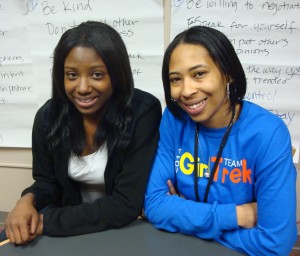RESTORING JUSTICE
Making Things Right: Victim-offender Conferencing
Practicing Restorative Justice in the Schools
Restoring Justice: Peacemaking Court Project
When the Ypsilanti and Willow Run Community School Districts consolidated on July 1, 2013, the administration and staff made a fundamental commitment to do things differently. They decided to take a “restorative†approach to discipline and to creating a sense of community.
In late August staff received training from the International Institute of Restorative Practices to learn how to teach students to own and accept responsibility for what they did wrong, and to be an active part of the solution to make things right. In January Ypsilanti Community Schools became the first school district in the state to take the “Solutions Not Suspensions†pledge to support restorative justice and other positive forms of discipline that keep students in the classroom.
“We can’t do things the same way and expect different results,†said Justin Jennings, principal of Ypsilanti Community High School. “We need kids who have empathy and care. It doesn’t matter whether they’re black or white. The kids need to hear that we love them.â€
Since 2012 The Dispute Resolution Center, (DRC) which serves Washtenaw and Livingston Counties, has partnered with Ypsilanti Community High School to develop a peer mediation program and provide conflict resolution services the Restorative Center. The center is a welcoming place where students can develop skills to peacefully resolve conflict. Over 66 days of suspension have been averted at Ypsilanti Community High School from September 2013 through January, 2014 through restorative circles and conferences facilitated by DRC staff and volunteers.
“It’s hard to get back on track after you’ve been suspended for 10 days,†said Belinda Dulin, DRC Executive Director. “You’ve harmed the school community and have a responsibility to make things right. Restorative justice is about having honest, difficult conversations and working together to create solutions.â€
Alexis Boyden, assistant principal of Ypsilanti Community High School, sees the value of restorative justice for students while they’re in school and after they graduate. “It’s just the beginning,†she said. “We’re evolving into a community where students are more thoughtful in their actions to create a safe learning environment and solve problems.â€
Her hope is that students will learn that there are other ways to solve problems besides using your fists so they can get hired and keep their job. It’s a different kind of survival skill that also helps students connect with their teachers and administrators on a deeper, more trusting level.
Jesse Donaghue teaches Spanish at Ypsilanti Community High School and recently participated in a Restorative Conference with students who had been suspended. “I like that it’s equitable,†he said. “Everyone is on the same level, and able to speak their piece. It’s a nice, organic atmosphere where you can repair relationships and find solutions.â€
Andryia Goins, a paraprofessional and junior varsity coach for the girls basketball team at Ypsilanti Community High School, has participated in restorative circles and conferences.
“It’s set up to respect everyone’s feelings and how they were affected by the conflict,†she said. “It was a good experience and provides a space and opportunity to build relationships with students. It makes whoever is involved take responsibility for their part in the conflict.â€
by Keely Kaleski.  Keely coordinates the Restorative Practices program at Ypsilanti Community High School for the DRC. “One of my favorite circles involved two students on a sports team,†she said. “They had a disagreement that almost escalated into a fight, met in a circle to resolve their differences, avoided getting suspended, and won the game that night.â€
